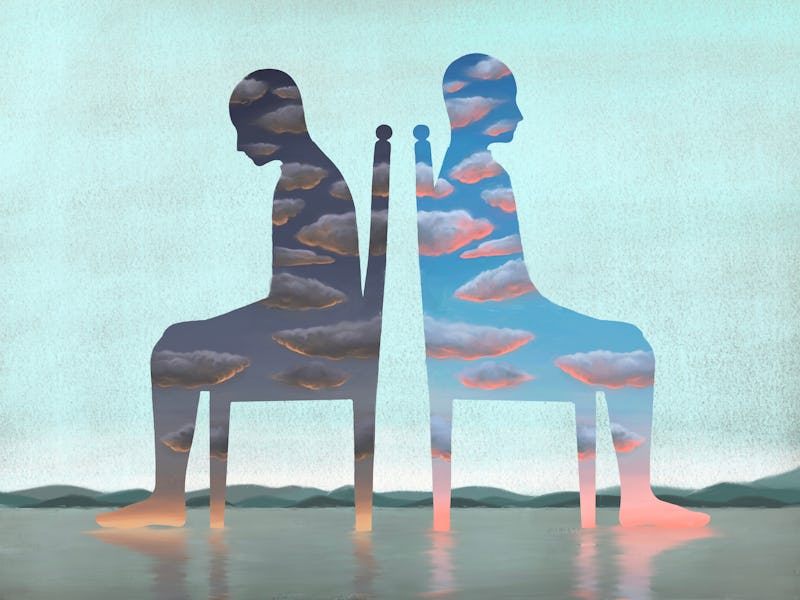Why a 'normal part of depression' is an incorrect assumption
“The beauty of this is everybody can do it."

Mental health journeys are often rife with paradoxes. Depression is a poignant example. You may know that physical activity, for example, will dampen the effects of depression. But experiencing depression often makes it difficult to engage in physical activity.
A number of studies suggest activity and depressive symptoms have a bidirectional relationship, and data supports this paradox. A risk factor for the onset of depression is low levels of physical activity, and people with major depressive disorder have a 50 percent odds of not meeting recommended physical activity levels. Meanwhile, exercise can improve depressive symptoms.
In a new study published in the Journal of Affective Disorders, researchers examined an essential and influential detail in the mix: the morning. That time when the day’s activities can begin — if you get out of bed. University of Pittsburgh researchers found that while depression is associated with lower activity levels overall, for people over the age of 30 this is especially pronounced in the morning.
First author Stephen Smagula, an assistant professor of psychiatry and epidemiology, tells Inverse it’s been known people with depression have difficulty getting the day started. The research world, meanwhile, is catching up to creating treatments that can help.
And help is something that is, at times, not an obvious option to people experiencing this struggle. Smagula says he’s had older adults with depression come to him and express they have trouble with mornings, but they’ve been told “that’s just a normal part of depression.”
“I really don’t like that people have been told it is just some inevitable thing,” Smagula says. “‘That’s just depression.’ It doesn’t have to be that way.”
How depression, age, and activity connect
Smagula and his colleagues analyzed a survey of 4,390 adults who completed measurements of depression and activity data.
A device worn on the right hip called an Actigraph accelerometer was used to measure activity during waking hours, while a nine-item questionnaire was used to assess the presence or absence of clinically significant depression symptoms. Overall, depression was most prevalent among people between the ages of 45 to 59, women, and Black participants.
When you have trouble sleeping, it’s recommended to get yourself up in the morning rather than try to make up those hours.
Age revealed itself to be an obvious differentiator when it came to being active in the morning. Overall, depressed adults 30 and older were less active throughout the day compared to depressed adults younger than 30, and this effect was largest in the morning hours.
“The relative activity deficit that was associated with prevalent depression symptoms accumulated most rapidly over a few mornings and continued until late in the night,” the study team writes.
The question of why this affected people older than 30, the researchers write, is “perplexing.” Smagula speculates the answer could be the social and cultural forces that shape when we’re active. Life circumstances influence when we choose to sleep and choose to be awake. Younger people, for example, may be active earlier simply because they have to get to school.
Why is it so hard to get up in the morning?
The reasons it can be so difficult to get the day started are complex and, at times, situation-dependent.
Recent research suggests some people are more naturally inclined to be “morning larks” than others, and diurnal activity — a biological rhythm that synchronizes the day/night cycle — can influence mood. A study published in July 2020 in the journal Nature found some correlation between changes in diurnal activity rhythm and depression, while other research suggests a link between chronotypes, sleep schedules, and depression. (One’s chronotype is their propensity to sleep at a specific time during a 24-hour period.)
However, what’s going on here seemingly has more to do with psychology than a mismatch between diurnal activity and an unforgiving schedule, Smagula says. More research is needed, but what was observed here wasn’t preferring to start the day at different times — it was spending more time in bed, avoiding the day.
“Our behavior and our psychology shape each other,” Smagula says.
“This idea is that if you wake up and are immediately primed to think about stressors, this context can set off an escape response. One way to deal with this stress is to stay in bed.”
What to do with this information? — Smagula sees this information as an opportunity. Studies on behavioral treatments for insomnia suggest intervention can treat sleep problems. It could work on people who avoid the day by staying in bed.
"You can't force yourself to sleep well. You can force yourself to stay awake."
Insomnia behavioral treatments, he explains, restrict the amount of time spent in bed. Instead of staying in bed late after a night of tossing and turning, it’s recommended to get yourself up in the morning rather than try to make up those hours. After a day of being tired, you might find yourself sleeping more soundly.
“You can’t force yourself to sleep well,” Smagula says. “You can force yourself to stay awake.”
He’s currently working on a small pilot study where this type of intervention is applied to people having difficulty with mornings. In many ways, it means helping people come up with a schedule they can be held accountable for.
“The way you wake up is a learned behavior in that the act of doing new behaviors and repeating them can help you learn to be a morning type and actually enjoy your mornings,” Smagula says. “Simply scheduling activity and helping people follow through can help them feel more alert.”
Very early data suggests this type of pragmatic behavioral intervention does work.
“The beauty of this is everybody can do it,” Smagula says.
“You can make an action plan. Waking up should not be a miserable experience. It’s something we can target and treat.”